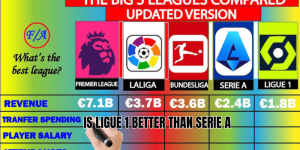In the battle of Europe’s top leagues, is La Liga better than Ligue 1 remains a hot debate among fans, analysts, and players alike. At CicloKick, we believe the answer isn’t simply “yes” or “no” — both leagues have their strengths, and the verdict depends on what you value most: tradition, competition, global reach, finances, or rising talent. But if you force us to pick, La Liga holds the edge in several key areas — though Ligue 1 is no slouch. Let’s dive in.
La Liga vs Ligue 1: What metrics matter

Before comparing, it’s essential to pick criteria. Some of the most relevant benchmarks are:
- UEFA country coefficients & club performance in Europe
- Financial power: revenues, TV rights, player wages
- Competitive balance: how many teams really compete for the title, top 4, etc.
- Talent development & star players
- Fan engagement & global popularity
How they stack up: La Liga’s advantages
Below are the main areas where La Liga tends to outperform Ligue 1.
UEFA Coefficients & European success
- Spain is ahead of France in the latest UEFA country rankings. Spain (La Liga) ranks 4th, while France (Ligue 1) is 5th.
- Spanish clubs regularly go deep in Champions League, Europa League, etc. Even if there are occasional underperformances, the consistency, especially by Real Madrid, Barcelona, Atléticotc., adds to La Liga’s prestige.
Financial power & media rights
- La Liga’s revenue base is generally stronger, especially at the top end. Clubs Real Madrid, Barcelona have massive commercial earnings, strong brands, lucrative global TV deals.
- Meanwhile, Ligue 1 has been struggling with decreasing TV rights deals. For example, recent seasons have seen lower broadcast income, which restricts what mid-tier French clubs can spend, invest, or retain.
Talent, stars & global attraction
- La Liga tends to attract more established global stars. Also, its track record of producing young talents (think Pedri, Gavi, Lamine Yamal) is very strong.
- Ligue 1 also produces talent (PSG, Monaco, Lyon, etc.), often exporting to bigger leagues. But the top stars are more likely to head toward Spain, England, or even Germany when given the choice.
Competitive narrative & legacy
- La Liga has deep historical rivalries. The narrative of El Clásico, derbies, etc., gives it a richer tradition.
- Titles in La Liga are still often contested, which helps maintain global watching interest.
Where Ligue 1 holds its ground

It’s not all one-sided. Here are areas where Ligue 1 remains competitive or even better in some respects.
Youth development & affordability
- Ligue 1 has been a hotbed for youth. Clubs often can’t compete financially with La Liga giants, so they invest in scouting, academy programs. Players break through early.
- For some fans, seeing young French talents come through is more exciting because there’s more unpredictability — less of a “big two/three get everything”.
Strength at the top & PSG factor
- PSG gives Ligue 1 a club that can (when well-built) challenge at the highest level. They draw massive names, perform in Champions League, etc. That helps raise the profile of Ligue 1 globally.
- The dominance of PSG can be seen as a downside for competitive balance, but their presence has benefits (media interest, player attraction).
Domestic drama & passion
- Passionate support, great stadiums, iconic clubs like Marseille, Lyon, Monaco. The league has its own flavor, often more physical, unpredictable in matches.
- Some greatness emerges “under budget” — big performances in Europe despite financial disadvantages compared to La Liga’s top clubs.
Weaknesses of each league

To be fair, both leagues face challenges.
- La Liga criticisms: financial troubles, occasional over-reliance on big clubs, unevenness in the mid/lower table.
- Ligue 1 criticisms: TV rights decline, star flight (top players leaving early), fewer deep runs in European competitions beyond PSG, and occasionally a lack of balance.
Head-to-head recent data
To illustrate:
- In current UEFA country ranking, Spain leads France.
- TV rights in France have decreased — for example, the Ligue 1 deal was pegged at around €660 million per season from 2024–29, down.
- In Ligue 1’s 2024-25 season: PSG won, but the gap to others was large; dominance was long and clear.
- Attendance figures, goals.
So, is La Liga better than Ligue 1?
Putting all of that together: Yes, La Liga is generally better than Ligue 1 — especially in regards to financial strength, global appeal, depth at the top, and historical prestige. But better doesn’t mean perfect, and it doesn’t mean Ligue 1 is weak. Ligue 1 has its unique charm, rising stars, and moments of brilliance.
What this means for fans
- If you want top-tier European football, global stars, big rivalries, and legacy, La Liga is more likely to deliver.
- But if you prefer seeing young talent break through, more unpredictability, and perhaps more emotional underdog stories, Ligue 1 delivers value.
- For both leagues, keeping close tabs on finances, TV deals, and European performance will shape who leads in coming years.
Conclusion
Is La Liga better than Ligue 1? Yes — for now. Thanks to stronger financial power, better European showings, and dee, Ligue 1’s strengths—youth development, some drama, and PSG’s global impact—mean it’s not far behind in certain respects.
CicloKick will continue tracking both: watching how TV rights, youth talent, and club performance evolve, because in football, things change fast. If you enjoyed this breakdown, let us know: should we compare La Liga vs Premier League next? Or dig into Ligue 1’s best youth products? Let’s keep the debate alive.







